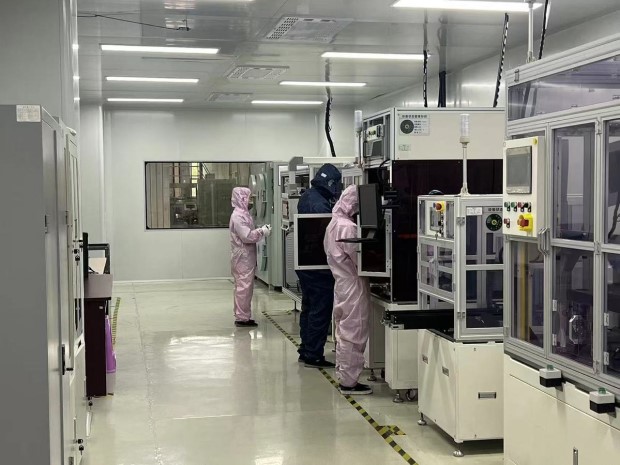
Doctors Energy to mass produce its quasi-solid-state products from Oct

Employees work at Doctors Energy's battery production line in Tianjin.[Photo/China Daily]
Chinese solid-state battery technology company Doctors (Tianjin) Energy Technology Inc plans to start all-solid-state battery (ASSB) production by 2026, after it starts operating a 1 gigawatt-hour quasi-solid-state battery production line.
Pan Qinghai, founder of Doctors, said in an exclusive interview with China Daily that the company is expected to mass produce its frontier quasi-solid-state batteries in October, and is likely to become the first domestic firm to achieve GWh-scale output for this advanced battery technology.
The Baodi, Tianjin-based company is also constructing a new 10 GWh solid-state lithium-ion battery facility with a total of investment of 5 billion yuan ($700 million). The new project is expected to begin with a 5 GWh mass production line in late 2025 and with full production of ASSBs by 2027.
Solid-state batteries offer higher theoretical energy density and safety, and entail lower costs than lithium-ion batteries that currently dominate the electric vehicle sector. Many countries consider them, especially ASSBs, a potentially game-changing technology.
The industry categorizes batteries based on the proportion of liquid electrolytes they contain, ranging from liquid (25 percent) and semisolid (5-10 percent) to quasi-solid (0-5 percent) and all solid (0 percent).
"Given the current immature upstream supply chain for solid electrolytes and dry electrode technologies, the company now mainly focuses on quasi-solid-state batteries. But efforts on such batteries will become a strategic steppingstone toward all-solid-state technology," he said.
According to Pan, Doctors boasts several proprietary technologies in quasi-solid-state batteries, especially pioneering an in-body and out-body dual polymerization technology, which successfully addresses the notorious interface problems plaguing solid-state lithium batteries.
Its use of a unique polymer-inorganic salt composite electrolyte has also solved conductivity issues at both room and low temperatures.
Today, countries around the world are accelerating the development of solid-state batteries, and trying to gain a foothold in this niche sector. Japan, which has been striving to develop ASSBs since 2018, currently has the highest number of related patent applications.
As China steps up its efforts to develop solid-state batteries amid intensified competition, many Chinese companies have already gained some momentum in commercializing the technology, including reducing the cost.
Pan said that Doctors' prototypes of ASSBs are priced "comparably to", if not lower than, quasi-solid batteries.
Bolstered by a team of multidisciplinary experts from the United States, Japan, and China, as well as a robust management and marketing framework, Pan said that the company is "pretty confident" in achieving its goals.
Baodi district, home to Doctors' headquarters, is rapidly positioning itself as a hub for battery innovation. With support from the local economic development zone, the company has made significant strides in integrating into the regional battery supply chain.
Li Shuang, general manager of Tianjin Baodi Economic and Technological Development Zone Investment Development Group Co Ltd, said: "Doctors is a critical component of our battery industry cluster. Their advancements have elevated the competitiveness of Baodi's energy sector as a whole."
Notably, the company is further bolstered by financing from Tianjin SME Credit Financing Guarantee Co Ltd, the largest State-owned credit financing guarantee company in Tianjin, with its project "Jin Zhong Zi" exclusively offering high-tech small and medium-sized enterprises substantial credit guarantees in financing.
Yang Dongxiang, the guarantee company's chairman of the board, said that Doctors, as an SME in the research and development and manufacturing of solid-state lithium batteries, is fully aligned with national strategies and industrial policies.
Its solid-state battery technology is globally advanced and is widely acknowledged as the next-generation solution for solid-state battery energy, Yang said.
"We hope that by providing guarantees and introducing initial loans to the company, we can attract more banks, funds and venture capital institutions, allowing the company to secure both equity and debt financing," he added.

Copyright © 2024 Tianjin Municipal People's Government. All rights reserved.

Copyright © 2024 Tianjin Municipal People's Government. All rights reserved.